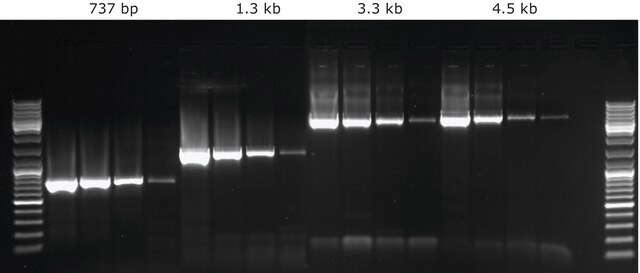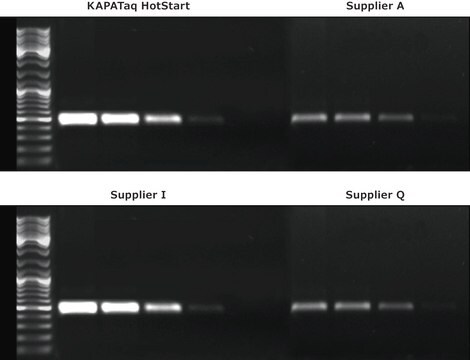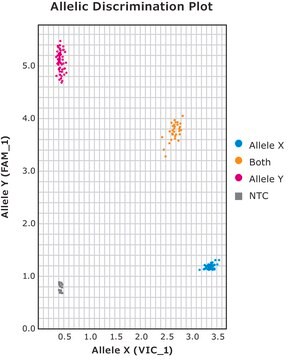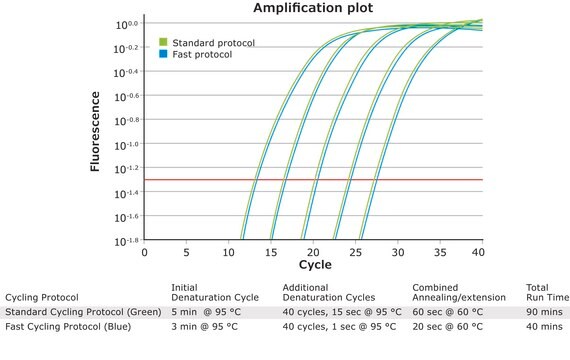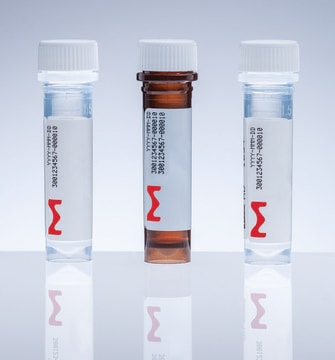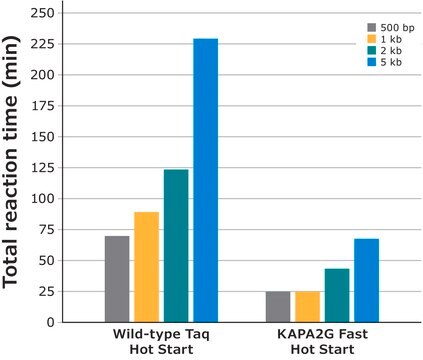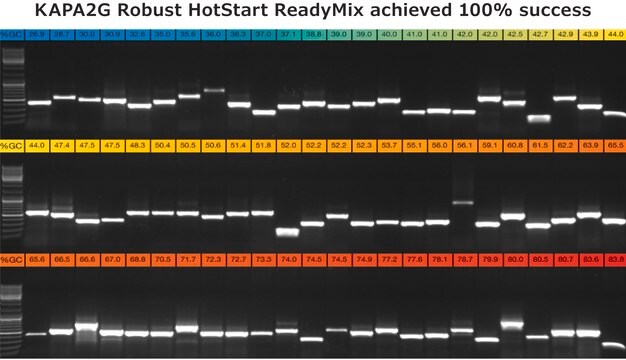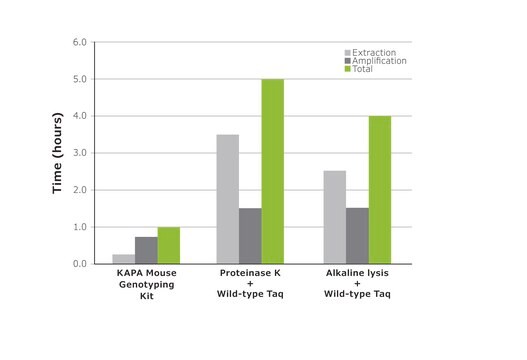3GPHSKB
Roche
KAPA3G Plant PCR Kit
Synonyme(s) :
PCR, Plant PCR
About This Item
Produits recommandés
Utilisation
sufficient for 250 reactions
50 μL sufficient for 250 reactions (KK7251)
sufficient for 500 reactions
50 μL sufficient for 500 reactions (KK7252)
Niveau de qualité
Durée de conservation
≤12 mo.
Caractéristiques
Difficult Templates/Specialty Enzymes PCR
dNTPs included: no
hotstart: no
Fabricant/nom de marque
Roche
Technique(s)
PCR: suitable
Entrée
crude DNA
Température de stockage
−20°C
Description générale
KAPA3G Plant DNA Polymerase is a blend of the engineered A-family KAPA3G DNA Polymerase and a modified B-family DNA Polymerase. The enzyme blend is combined with proprietary antibodies to inactivate the enzymes prior to the first denaturation step. The fidelity of the KAPA3G Plant DNA Polymerase is 4-10 times higher than that of wild-type Taq.
Application
- Amplification of fragments up to 5 kb in size from purified plant DNA, extracted with commercial kits or cetyl trimethyl ammonium bromide (CTAB)-based methods
- Direct polymerase chain reaction (PCR) from leaf discs, seed samples, and other plant tissue types
- PCR from crude plant DNA extracts, prepared from leaf and/or seed material
- amplification of 16SrRNA
- an ultra-rapid real-time reverse transcriptase (RT)-PCR assay
Caractéristiques et avantages
- Fast PCR direct from plant tissues such as leaf discs, seeds and crude plant extracts.
- Streamlined workflows for transgenic screening.
- Improved PCR success rates and reproducibility.
- Efficient amplification of long and difficult targets from all sample types.
Amplify long targets from crude samples and purified DNA:
- Amplify fragments up to 5 kb from purified DNA and crude samples
- High yield and specificity with purified DNA and crude samples
Perform direct PCR from a variety of plant species and tissue types:
- Direct PCR with leaf disc or seed as template
- No need for time-consuming DNA extractions
Streamline workflows and improve turnaround times:
- Perform PCR in half the time compared with wild-type enzymes
- Eliminate the need for time-consuming
DNA extractions Improve success rates with novel crude sample plant PCR workflow:
- Use extraction buffer to prepare crude extracts for plant PCR in just 5 minutes
- High success rates with even the most challenging sample types
Quick Notes:
- KAPA3G Plant DNA Polymerase is tolerant to plant-derived PCR inhibitors, and can amplify frompurified DNA, crude extracts, and plant material.
- Optimize reaction conditions using purified DNA before attempting direct or crude sample PCR.
- For direct PCR, use a sampling tool to control the amount of plant material added to the reaction. The use of excessive amounts of crude plant material in PCR is a major cause of direct PCR reaction failure.
- For crude sample PCR, prepare a crude DNA extract using a small amount of plant material in Extraction Buffer (Refer to Section 3: Crude sample PCR), and use 1 μL per 50 μL reaction.
- KAPA Plant PCR Buffer contains MgCl2 (1.5 mM at 1X) and dNTPs (0.2 mM each at 1X). Additional MgCl2(25 mM) is supplied separately for optimization.
Qualité
Notes préparatoires
Autres remarques
Composants de kit seuls
- KAPA3G Plant DNA Polymerase 2.5 U/μL
- KAPA Plant PCR Buffer (2X) contains MgCl2 and dNTPs
- MgCl2 25 mM
Code de la classe de stockage
12 - Non Combustible Liquids
Classe de danger pour l'eau (WGK)
WGK 1
Point d'éclair (°F)
does not flash
Point d'éclair (°C)
does not flash
Certificats d'analyse (COA)
Recherchez un Certificats d'analyse (COA) en saisissant le numéro de lot du produit. Les numéros de lot figurent sur l'étiquette du produit après les mots "Lot" ou "Batch".
Déjà en possession de ce produit ?
Retrouvez la documentation relative aux produits que vous avez récemment achetés dans la Bibliothèque de documents.
Les clients ont également consulté
RESULTS FOR PLASTID DNA
identification
Articles
An overview of directed evolution and the methods for generating proteins with optimized or entirely new functions.
Notre équipe de scientifiques dispose d'une expérience dans tous les secteurs de la recherche, notamment en sciences de la vie, science des matériaux, synthèse chimique, chromatographie, analyse et dans de nombreux autres domaines..
Contacter notre Service technique
